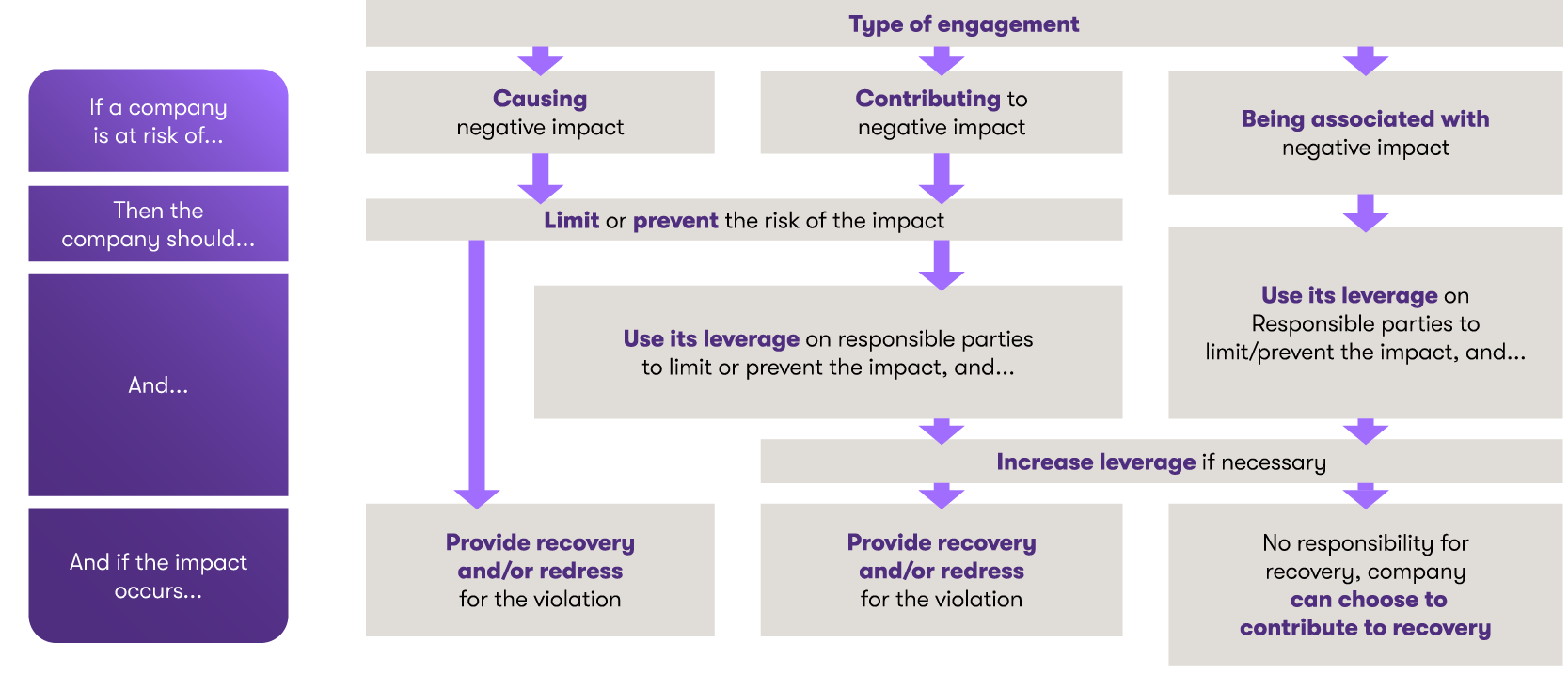-
Financial administration & outsourcing
Entrepreneurs who outsource financial administration reduce the number of administrative tasks and consequently have more time and space to focus on growth.
-
Financial insight
We help you turn financial data into valuable insights that support you in making well-founded decisions. In-depth analyses of your financial situation will help give you a better idea of where you stand and where the opportunities for growth lie, both in the short and long term.
-
Financial compliance
We make sure your company complies with financial legislation and regulations, with correct financial statements, tax reports and other obligations. From our global network, we support you in managing local and international tax risks.

-
Impact House by Grant Thornton
Building sustainability and social impact. That sounds good. But how do you go about it in the complex world of stakeholders, regulations and frameworks and changing demands from clients and society? How do you deal with important issues such as climate change and biodiversity loss?
-
Business risk services
Minimize risk, maximize predictability, and execution Good insights help you look further ahead and adapt faster. Whether you require outsourced or co-procured internal audit services and expertise to address a specific technology, cyber or regulatory challenge, we provide a turnkey and reliable solution.
-
Cyber risk services
What should I be doing first if my data has been kidnapped? Have I taken the right precautions for protecting my data or am I putting too much effort into just one of the risks? And how do I quickly detect intruders on my network? Good questions! We help you to answer these questions.
-
Deal advisory
What will the net proceeds be after the sale? How do I optimise the selling price of my business or the price of one of my business activities?
-
Forensic & integrity services
Do you require a fact finding investigation to help assess irregularities? Is it necessary to ascertain facts for litigation purposes?
-
Valuations
Independent and objective valuations tailored for mergers, acquisitions, and legal matters.

-
Auditing of annual accounts
You are answerable to others, such as shareholders and other stakeholders, with regard to your financial affairs. Financial information must therefore be reliable. What is more, you want to know how far you are progressing towards achieving your goals and what risks may apply.
-
IFRS services
Financial reporting in accordance with IFRS is a complex matter. Nowadays, an increasing number of international companies are becoming aware of the rules. But how do you apply them in practice?
-
ISAE & SOC Reporting
Our ISAE & SOC Reporting services provide independent and objective reports on the design, implementation and operational effectiveness of controls at service organizations.

-
International corporate tax
The Netherlands’ tax regime is highly dynamic. Rules and the administrative courts raise new challenges in fiscal considerations on a nearly daily basis, both nationally and internationally.
-
VAT advice
VAT is an exceptionally thorny issue, especially in major national and international activities. Filing cross-border returns, registering or making payments requires specialised knowledge. It is crucial to keep that knowledge up-to-date in order to respond to the dynamics of national and international legislation and regulation.
-
Customs
Importing/exporting goods to or from the European Union involves navigating complicated customs formalities. Failure to comply with these requirements usually results in delays. In addition, an excessively high rate of taxation or customs valuation for imports can cost you money.
-
Human Capital Services
Do your employees determine the success and growth of your organisation? And are you in need of specialists which you can ask your Human Resources (HR) related questions? Human Resources (HR) related questions? Our HR specialists will assist you in the areas of personnel and payroll administration, labour law and taxation relating to your personnel. We provide you with high-quality personnel and payroll administration, good HR guidance and the right (international) advice as standard. All this, of course, with a focus on the human dimension.
-
Innovation & grants
Anyone who runs their own business sets themselves apart from the rest. Anyone who dares stick their neck out distinguishes themselves even more. That can be rather lucrative.
-
Tax technology
Driven by tax technology, we help you with your (most important) tax risks. Identify and manage your risks and become in control!
-
Transfer pricing
The increased attention for transfer pricing places greater demands on the internal organisation and on reporting.
-
Sustainable tax
In this rapidly changing world, it is increasingly important to consider environmental impact (in accordance with ESG), instead of limiting considerations to financial incentives. Multinational companies should review and potentially reconsider their tax strategy due to the constantly evolving social standards
-
Pillar Two
On 1 January 2024 the European Union will introduce a new tax law named “Pillar Two”. These new regulations will be applicable to groups with a turnover of more than EUR 750 million.
-
Cryptocurrency and digital assets
In the past decade, the utilization of blockchain and its adoption of a distributed ledger have proven their capacity to revolutionize the financial sector, inspiring numerous initiatives from businesses and entrepreneurs.
-
Streamlined Global Compliance
Large corporations with a presence in multiple jurisdictions face a number of compliance challenges. Not least of these are the varied and complex reporting and compliance requirements imposed by different countries. To overcome these challenges, Grant Thornton provides a solution to streamline the global compliance process by centralizing the delivery approach.
-
Corporate Law
From the general terms and conditions to the legal strategy, these matters need to be watertight. This provides assurance, and therefore peace of mind and room for growth. We will be pro-active and pragmatic in thinking along with you. We always like to look ahead and go the extra mile.
-
Employment Law
What obligations do you have with an employee on sick leave? How do you go about a reorganisation? As an entrepreneur, you want clear answers and practical solutions to your employment law questions. At Grant Thornton, we are there for you with clear advice, from contracts and terms of employment to complex matters such as dismissal or reorganisation.
-
Sustainable legal
At Grant Thornton, we help companies integrate sustainability into their business operations, with sustainable legal at the heart of our approach. We advise on ESG (Environmental, Social, Governance) legislation, and help draft sustainable contracts, implement HR policies, and carry out ESG due diligence in M&A transactions (Mergers and Acquisitions).
-
Maritime sector
How can you continue to be a global leader? The Netherlands depends on innovation. It is our high-quality knowledge which leads the maritime sector to be of world class.


What is the CSDDD?
The CSDDD largely follows the steps outlined in the OECD Guidelines for Multinational Enterprises on Corporate Social Responsibility, a voluntary framework for responsible business conduct. Companies subject to the CSDDD must conduct risk analyses and monitor, prevent, mitigate, remedy, and cease any harm to people and the environment within the value chain. Additionally, companies must develop a climate transition plan, which will be evaluated annually. Furthermore, companies must establish due diligence procurement policies and action plans, which must be made publicly available.
The link between CSRD and CSDDD
The Corporate Sustainable Reporting Directive (CSRD) sets the stage as a reporting regulation, emphasizing the importance of improving transparent sustainability reporting of EU companies and increasing the credibility and comparability of ESG efforts. By defining material topics and setting targets, companies disclose their environmental and social impacts, risks, and opportunities and how they act on these. The CSDDD takes this a step further by introducing mandatory value chain due diligence - it ensures that both EU and non-EU companies take responsibility for the negative impacts their activities in the supply chain cause globally.
Which companies fall under CSDDD and when?
The legislation will predominantly affect large companies (both within and outside the EU) with over 1000 employees and 450 million euros in turnover. European member states have a 2-year window to implement this law nationally, thus the implementation will be phased based on company size and turnover:
- 2027: >5000 employees, €1500M turnover
- 2028: >3000 employees, €900M turnover
- 2029: >1000 employees, €450M turnover
Steps in a CSDDD trajectory
Grant Thornton Impact House is leading the charge in helping organisations prepare for CSDDD obligations, simultaneously supporting them in taking a large step to create transparency on Human Rights and Environmental Risks in their value chain and defining what actions to take to improve. Here is how we help our clients:
- Value Chain & Stakeholder mapping.
- Stakeholder engagement and involvement.
- Risk & policy review: what is already known and in place?
- Identification of adverse impacts and risks in the supply chain through workshops, interviews & use of specialized databases.
- Risk Assessment & prioritization, using the Impact House risk assessment tool.
- Definition of mitigating actions and due diligence strategy
- Creation of a CSDDD readiness roadmap
- Implementation, execution of actions, and tracking of results.

Call to Action
- Value chain mapping and identifying negative impacts on people and the environment takes time.
It is crucial to start drafting or updating your due diligence strategy in the run-up to its adoption in 2027-2029. This directive requires cooperation with many internal and external stakeholders.
- Not a large company?
Your organisation is a part of multiple value chains. Large customers will request information and may require you to adhere to their due diligence policies and procedures.
Ready for the full Corporate Sustainability picture?
At Impact House, we strongly believe that considering the CSDDD deepens and adds value to your CSRD-proof reporting. Our experienced team is well-versed in navigating the complexities of Corporate Sustainability Due Diligence and offers support in every step of preparing for CSDDD. Below an overview of how we prioritize and approach negative impacts within your value chain.

Like to know more?
Please contact Grant Thornton Impact House for an introductory conversation or sparring session:





